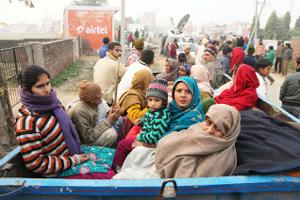Jammu, Jan 6: The number of people abandoning their homes in border villages of Jammu and Kashmir crossed 10,000 Tuesday amid heightened tension following Pakistan shelling on the international border that killed a trooper Monday.

"Following indiscriminate targeting of civilian areas along the international border by Pakistan yesterday (Monday), more people have abandoned their homes close to the border in Samba and Kathua districts," a senior official said.
"The number of villagers lodged in makeshift accommodations at safer places has crossed 10,000 and their migration is continuing today (Tuesday)," the official added.
Pakistan Rangers continued mortar shelling and firing at Border Security Force (BSF) positions in Kathua and Samba districts late Monday.
"Pakistan Rangers targeted more than two dozen BSF posts in Kathua and Samba districts yesterday (Monday). The BSF retaliated effectively to silence Pakistan guns," a senior police officer here said.
The officer said no firing has been reported from the Pakistan side Tuesday morning.
A trooper was killed Monday when the border outpost manned by him was hit by Pakistan fired mortar.
BSF Director General D.K. Pathak will visit the international border Tuesday to take stock of the situation.





Comments
Add new comment